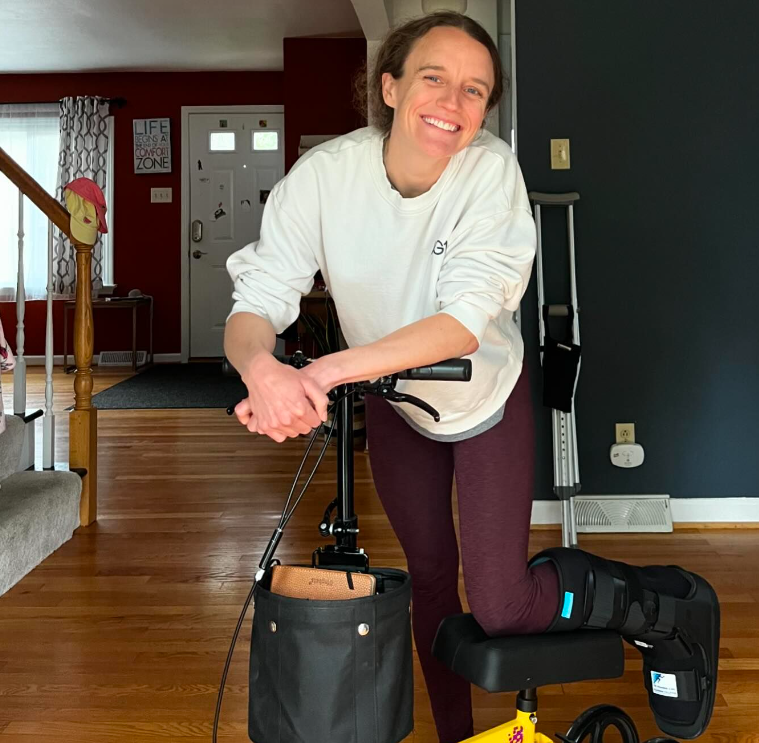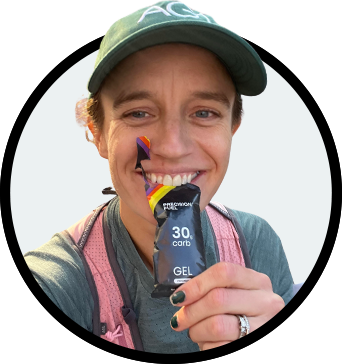The day before undergoing surgery on my Achilles, I couldn't stop crying. I was terrified.
It wasn’t that I feared the risks of the operation; I wasn’t even scared about the long-term outcome. What I did fear was the unknown, the lack of control I had over the situation. I recognised the need to accept and embrace the situation, but as someone who's used to controlling as many variables in my life as possible, I (like many endurance athletes) struggle with the unknown.
I have learned a lot about myself and taken some valuable lessons away from my first month of rehab post surgery...
Accept help
Most of us struggle with this, as we are so used to getting things done ourselves. I remember being an 18-year-old moving across the world from the UK to the US, trying to get on an escalator with two giant suitcases and a backpack, and refusing help from multiple people. I saw accepting help as an act of weakness; it was admitting to the world that I couldn’t do it on my own.
This injury really showed me that sometimes, especially when our bodies need to focus on recovery, we need to just take the help, rather than risk further injury or stress to our bodies. Believe me, it didn’t feel good as a 35-year-old to let my mother help me shower, but I knew that not letting her help meant risking setting myself back even further.
Allowing a kind man to wheel me to the airport bathroom two days after my surgery meant putting less strain on my body, which needed all its energy to heal.
Accepting assistance is something that takes practice, but it doesn’t only benefit you; it makes the person offering it feel good. They offered because they wanted to help, not because they thought you couldn’t do something. Let people help; you may just make their day too.

Treat the pain
I often tell friends that I'm not a “medication person". I generally avoid taking pain-relief unless I really need to. But a good friend reminded me in the days before my surgery that pain inhibits healing, and that my stubbornness to take the pain meds they gave me could make my healing journey take longer.
I used to think (along with every other elite athlete on the start line), that I was the toughest runner out there, that I could push through the pain more than anyone else. While that allowed me to reach some big goals and represent my country on the global stage, right now, it would hinder me more than help.
Treating pain doesn't mean that you're weak. It means you recognise that your body is working hard to heal, and you want to support it.
Eat and sleep
I promised myself that in the first two weeks post-surgery, I would prioritise sleep and nourishing food. I wanted to give my body the absolute best opportunity to recover... but also impress my surgeon with how good it looked at my check-up.
I don’t think I've ever slept so well or so much in my life. I didn't restrict foods I enjoy or force myself to have foods I really didn’t want; it was all about asking myself what would be best for healing.
At the end of the two weeks, I was in total awe of my body, even more than I had been postpartum after having my two kids. I couldn’t believe how well the body recovers if you give it nourishment and good sleep.
Celebrate the small wins
Of course, seeing the Strava activities or post-race reflections of friends and other athletes online can create a ping of envy: "I wish I was out there doing that."
But if you look closely enough, there are small wins to celebrate along the way that represent bigger things. As I increased the weight I could put on my foot with crutches from 20% to 30% to 40% over the course of a week, I could've easily looked at what I wasn’t doing, at the fitness that was dwindling away. Instead, I chose to appreciate that I was getting closer to 100% weight-bearing, a major milestone.
Would I rather be running? Sure, but I know that when I am, I will remember this time, when 50% of my body weight on my foot was a huge accomplishment. Just think of the story you'll be able to tell at the other end. It'll mean so much more than if everything went smoothly all the time.
Ultimately, I still have a long way to go. I'm four weeks out from my Haglund's Deformity removal and Achilles surgery. My surgeon has said it will likely be a year before I really get back to normal, and as of right now, I feel okay with that.
I know there will probably be some really hard days when I question myself and even the procedure, but I also know that this is part of my story, part of my journey. Races and good runs will always be there waiting, and in the meantime, I'm taking it one day at a time.
